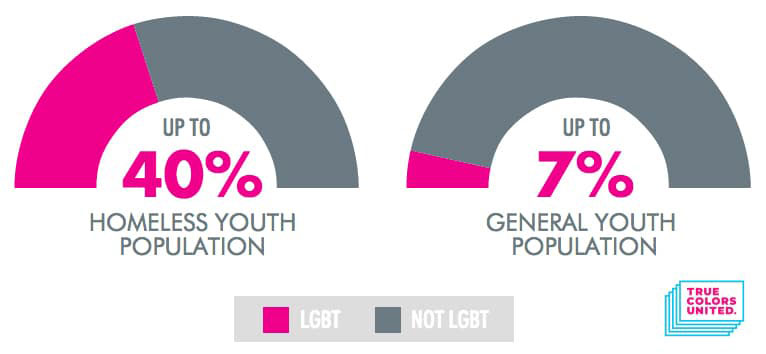Primary audience: health care organizations and providers
What is Gender-Affirming Care?
The term gender-affirming care is often used specifically to describe trauma-informed and patient-centered health care sought by trans and non-binary individuals; it can range from medical interventions like hormone replacement therapy and surgical interventions to non-medical gender affirmation that can support social and legal pathways to transition.
A gender-affirming model of care recognizes gender diversity and assists individuals with defining, exploring, and actualizing their gender identity without judgment or assumptions.
Gender-affirming care is recognized as medically necessary by major national and global health care organizations and research has demonstrated it is a life-saving intervention. Characterizations of gender-affirming care as cosmetic are harmful misconceptions.
Gender-Affirming Care and Homelessness
In between are Mobile Medical Units (MMU) of different sizes, some of which constitute the clinic itself whereas others simply transport the outreach team: but here there is a philosophical line.
Trans and non-binary individuals disproportionately experience homelessness, particularly unsheltered homelessness. According to the 2015 U.S. Transgender Survey:
- “Nearly one-third (30%) of respondents have experienced homelessness during their lifetime, including those who have stayed in a shelter, lived on the street, lived out of a car, or stayed temporarily with family or friends because they could not afford housing.”
- “The homelessness rate was substantially higher among respondents whose immediate family had kicked them out of the house, with nearly three-quarters (74%) of these respondents experiencing homelessness.”
- “The homelessness rate was also nearly twice as high among respondents who have done sex work (59%) and those living with HIV (59%), as well as respondents who have lost their job because of their gender identity or expression (55%).”
- “Transgender women of color, including American Indian (59%), Black (51%), multiracial (51%), and Middle Eastern (49%) women, also experienced especially high rates of homelessness.”
Despite the higher rates of homelessness for trans individuals compared to their cis peers, trans and non-binary people disproportionately face additional barriers to shelter, with 70% of respondents in the U.S. Transgender Survey who have stayed in a shelter reporting that they have faced mistreatment because they are transgender.
Unsurprisingly, then, trans and non-binary people disproportionately experience unsheltered homelessness compared to their cis peers and, as a result, report poorer health and increased risk of violence compared with their sheltered counterparts.
Homelessness disproportionately impacts LGBTQIA+ (including trans and non-binary) youth. While describing just 7% of the overall youth population, 40% of youth experiencing homelessness are LGBTQIA+. According to True Colors United, loss of housing for young people primarily stems from family conflicts, and for LGBTQIA+ youth, their gender or sexuality is central to that discord. Being forced out or fleeing home is the number one cause of homelessness for transgender youth, followed by other family issues and aging out of foster care.

Gender-Affirming Care and HCH: Resources and Opportunities
Under the framework of targeted universalism, embracing gender-affirming care benefits people of all genders, including cisgender people. When we make our health center culture, processes, and systems safe for the most marginalized, all patients stand to gain because trauma-informed values, for example, improve care for everyone. Especially because of the disproportionate impact of homelessness on gender-diverse people, we encourage you to embrace gender-affirming care as a best practice, and we have exciting opportunities to help you do so.
Start Here
Need 101-level content on LGBTQIA+ health care and homelessness? Want a resource to integrate into onboarding or academic assignments? This is the resource for you! This 1.5-hour-long webinar covers foundational terminology and concepts related to LGBTQIA+ identity and experience of homelessness with a focus on LGBTQIA+ health care. Participants will learn about healthcare disparities and applicable clinical practices that participants can integrate into their own contexts.
Happening Now: Ongoing Learning Opportunities
Applications Now Open for Year-Long Trans Health Learning Collaborative: In partnership with the National LGBTQIA+ Health Education Center, the National Health Care for the Homeless Council is excited to offer a dynamic clinical curriculum exploring the intersection of homelessness and gender-affirming care. Topics covered include hormone replacement therapy, surgical gender affirmation, non-medical gender affirmation, behavioral health care, and primary health care, among others.
This program will run from April 2022-March 2023 on the fourth Wednesday of every month. 24 CME credits are available. The sessions are two hours long and interested applicants will commit to:
- attendance by at least one medical provider and one behavioral health provider at all sessions
- submit two to three case presentations from your team over the course of the program
- send at least one representative of your team to an orientation session before program launch
- completion of the baseline, mid-program, and final surveys by all members of your team
Registration is now open for the May 2022 National HCH Conference and Policy Symposium:
After a two-year pause of in-person conferences, the Council is excited to host our 2022 National Conference in Seattle, WA. Opportunities abound to learn about starting or expanding gender-affirming care services and to be in community with other providers and consumers engaging in this essential work:
- Pre-Conference Institute:This full-day training on May 10, 2022, is for participants interested in starting or expanding gender-affirming care services within their HCH programs. The training will include concurrent sessions, one track for participants who are new to gender-affirming care and another for those who have provided gender-affirming care for years. We will discuss best practices and innovative ideas related to hormone therapy, developing community partnerships, gender-affirming surgery, behavioral health needs, and post-operative recovery. The group will engage in an interactive discussion on a constellation of intersecting issues, including interpersonal violence, sex work, unsheltered homelessness, substance use, and mental wellbeing. Participants will have the opportunity to engage in information-sharing and networking with clinicians from across the country. We welcome multidisciplinary care team members to join, including, but not limited to, community health workers, nurse practitioners, social workers, nurses, peer supports, physicians, psychologists, advocates, and PAs.
- Main conference workshops: Several 75-minute workshops during the main conference (May 11-12, 2022) will cover best practices for intersections of trans and non-binary health care. Topics include foundations of gender-affirming care, Native two-spirit identities and history, and the intersection of multidisciplinary gender-affirming care and immigration.
- Post–Conference Learning Lab: In partnership with Health Partners on IPV + Exploitation, this half-day training will provide an in-depth look at CUES: a healing-centered alternative to screening for interpersonal violence and exploitation. This training specifically employs a gender-expansive lens to look at how gender identity intersects with these topics.
Happening Now: Ongoing Learning Opportunities
Gender-Affirming Care and HCH National Work Group
This interdisciplinary collective will meet quarterly beginning in July 2022. Individuals with lived experience of gender-affirming care and homelessness, researchers, clinicians, advocates, public health professionals, and non-clinical health center staff are encouraged to join to help craft a national initiative on gender-affirming care and homelessness.
If you are interested in joining this work group, please contact Kelli Klein, Clinical Coordinator.
Gender-Affirming Care and HCH: A Literature Review
This publication will be reviewed by the Gender-Affirming Care Work Group. We hope to release in Fall 2022.
If you are interested in contributing to this publication, please contact Kelli Klein, Clinical Coordinator.
Additional Resources
- ‘Seeing People as They See Themselves’: Health Care Access for Transgender Individuals Experiencing Homelessness
- NHCHC, 2015
- Standards of Care for the Health of Transsexual, Transgender, and Gender Nonconforming People
- World Professional Association for Transgender Health, 2012
- Transitioning Our Shelters: A Guide to Making Homeless Shelters Safe for Transgender People
- National Gay and Lesbian Task Force, National Coalition for the Homeless, 2003
- Toolkit for Practitioners/Researchers Working with Lesbian, Gay, Bisexual, Transgender, and Queer/Questioning (LGBTQ) Runaway and Homeless Youth (RHY)
- National Resource Center for Permanency and Family Connections, Silberman School of School of Social Work, 2012
- Connections, Silberman School of School of Social Work, 2012

Guest post by Kelli Klein – She is responsible for planning and coordinating national peer learning opportunities for the HCH community, including learning collaboratives, webinars, and written materials. As part of the clinical team, her focus includes supporting health centers and non-clinical staff in providing high-quality, equitable care for people experiencing homelessness.

